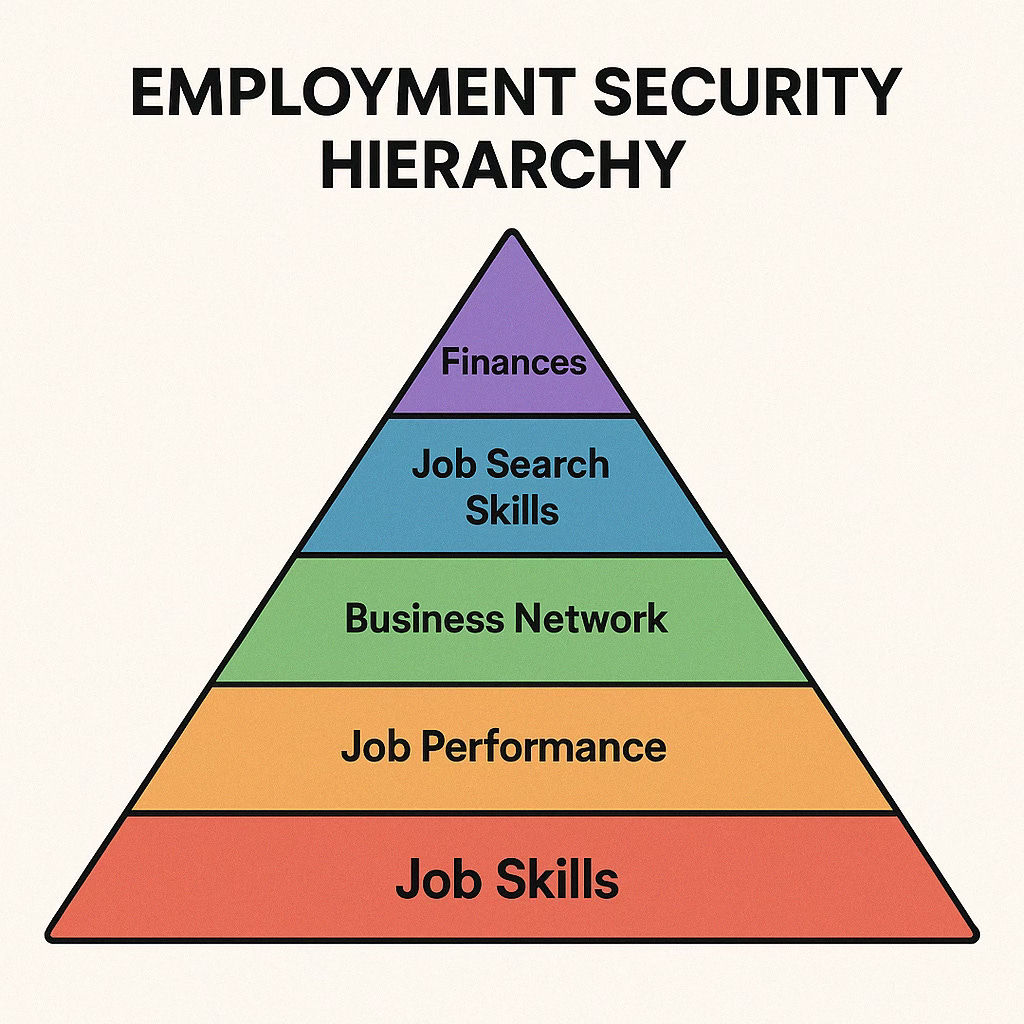Employment Security starts with job skills
As one of my coworkers said: "Have skills, will travel."

Mundane Job Skills are at the base of the Cubicle Warrior Employment Security Hierarchy. This is, perhaps, self-evident: if you don’t have job skills, you won’t have a shot at getting a job because you don’t “qualify” for the position.
The truth is, though, that most people don’t qualify for everything listed in the job description. Consequently, job skills are a bit more fluid than they might seem at first. But for every job widget—auto mechanic, project manager, CEO, doctor, lawyer, finance analyst—there is a list of pretty standard job skills needed for each position.
Additionally, every position has a “maximum” number of job skills; once you exceed what is needed, you become overqualified for the work and hurt yourself if you try a similar position in a different company. There is a difference in skills between Data Janitor I and Data Janitor III. Once you exceed the Data Janitor I job skills, it becomes harder to get that position because of the hiring bias of being overqualified for the job.
You should determine the maximum job skills needed for the position you are in or trying to get to, then compare that to your job skills. That difference is a gap that needs to be filled, so you are well qualified for the position, but not overqualified.
This newsletter focuses on helping knowledge workers navigate corporate America, from searching for jobs to working in the role, having employment security, and helping you become a Cubicle Warrior.
Navigating Corporate is a reader-supported publication. There are no investors. No sugar daddies. Just me. And the cats.
To receive new posts, become a free or paid subscriber.
The needed job skills change over time
As important as this is, the job skills requirements will change over time. What “well-qualified” you were for the job ten years ago (or two...) is now a bare minimum to maintain doing the work.
Take project management, for example. Ten years ago, having a Project Management Professional (PMP) certification wasn’t needed to do project management work and have a project manager title. Then, over the years, the PMP certification was a “desired” qualification. If you had one, you got preferential treatment and a likelier chance at getting an interview for a position.
Now, if you don’t have a Project Management Professional certification, you might get a job -- after all those people with the PMP certification get interviewed first, and then only if any jobs are left over.
The skills needed for the job change. If you are at the top of the pyramid and think you are hot stuff for getting there, finding a job in a tough economy when you haven’t kept up on developing your job skills puts you right back at the base of the hierarchy, looking up.
Skills—including soft skills like teamwork, facilitation, or thought leadership—change over time. You must visit the job skills level of the hierarchy regularly to ensure you have the best skills for your type of work.
Thus, you need to:
Know the job skills needed for your current job
Know what job skills you currently have
Identify the gap and acquire the job skills needed through training or on-the-job work
Consistently revisit your job skills compared to industry standards
How to gain job skills
Job skills, perhaps more than the other skills needed for Employment Security, are fluid. Utilizing Artificial Intelligence (AI) in your job now is a must; the need did not exist three years ago.
Gaining new and improved job skills requires looking for opportunities to do different work within your job. Maybe a new product, process, technology, or something else is different for your job. That’s something to volunteer to work on, support, and deliver good results for. That work will expand your skills and be worth adding to your resume.
Adjacent skills are another way to add to your skills inventory. They are not in your current job description, but support the work in your job description. My favorite example here is reporting. Your job description doesn’t require it, but then you’re asked to do charts and graphs to show some work for your manager. Do that work consistently, and you’ve gained an adjacent job skill for your resume.
Even going deep into some skill in your job description is a worthy cause. For example, I’m a basic Excel user. But others can make Excel sing, producing needed information clearly. Being an ‘expert’ level of some tool or process is worth developing as a skill.
Have skills, will travel
A broad range of job skills enables entrance to a variety of jobs, which could be in your chosen profession or something adjacent to it. Having good job skills doesn’t just mean moving horizontally, but it also means a better chance at getting promotions. Job skills are the basis of everything about gaining Employment Security.
On the other hand, you can have great job skills, but if your job performance isn’t up to par, well, we’ll discuss it tomorrow as part of the next level up in the Employment Security Hierarchy.
Be a Cubicle Warrior,
Scot



